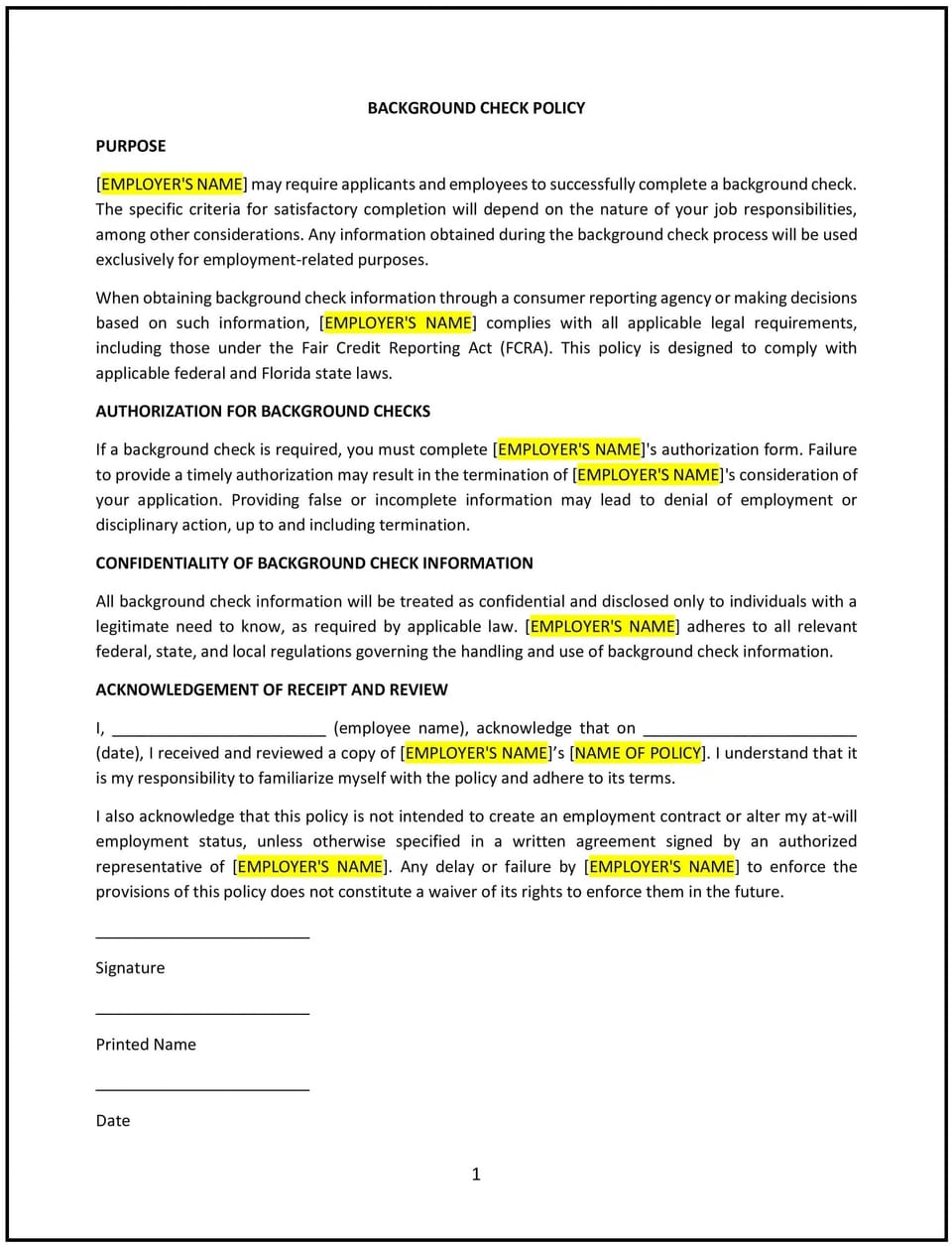Background check policy (Florida): Free template

Background check policy (Florida)
A background check policy helps Florida businesses establish a framework for conducting pre-employment and periodic screenings to promote safety, integrity, and informed hiring decisions. This policy outlines procedures for obtaining consent, conducting checks, and using the information responsibly. It is designed to support fair hiring practices, reduce risks, and provide clear guidelines for managing background check processes.
By implementing this policy, businesses in Florida can demonstrate their commitment to creating a safe and trustworthy workplace, align with state-specific regulations, and foster transparency in hiring practices.
How to use this background check policy (Florida)
- Define the scope of background checks: Clearly specify the types of checks conducted, such as criminal history, employment verification, or credit reports, and the roles they apply to.
- Obtain written consent: Outline how businesses should request and document employee or candidate consent before initiating background checks.
- Address legal requirements: Explain how to adhere to federal and state laws, such as the Fair Credit Reporting Act (FCRA) and Florida’s specific regulations, when conducting checks.
- Provide transparency: Specify how candidates will be informed about the process, including how results may impact hiring decisions.
- Establish decision-making criteria: Outline how background check results will be evaluated and used in hiring or promotion decisions.
- Communicate the policy: Share the policy with employees and candidates during onboarding or recruitment to ensure awareness and understanding.
- Monitor adherence: Regularly review background check processes and address any concerns or discrepancies promptly.
- Update the policy: Periodically assess the policy to reflect changes in laws, regulations, or business needs.
Benefits of using this background check policy (Florida)
This policy offers several advantages for Florida businesses:
- Promotes safety: Clear guidelines help identify potential risks and create a secure workplace environment.
- Reduces risks: Defined procedures minimize the likelihood of negligent hiring claims or other liabilities.
- Supports fairness: A consistent policy ensures that all candidates are treated equally during the screening process.
- Enhances hiring quality: Informed decisions based on verified information contribute to better hiring outcomes.
- Builds trust: Transparent processes demonstrate the business’s commitment to ethical and responsible hiring practices.
- Aligns with legal standards: Reflects Florida’s focus on protecting individuals’ rights while supporting business needs.
- Improves reputation: A robust policy showcases the business’s dedication to safety, integrity, and accountability.
Tips for using this background check policy (Florida)
- Communicate clearly: Ensure candidates and employees understand the policy by providing written materials and discussing it during recruitment or onboarding.
- Train managers: Educate supervisors on how to interpret background check results and make fair, informed decisions.
- Use accredited providers: Partner with reputable background check vendors to ensure accuracy and compliance with legal requirements.
- Stay informed: Keep up with changes in federal and state laws, such as updates to the FCRA or Florida-specific regulations, that may affect background check practices.
- Encourage transparency: Provide candidates with clear information about the process and how results will be used in decision-making.
- Review periodically: Assess the policy’s effectiveness and make updates as needed to reflect changes in laws, business needs, or operational goals.
Q: Why should Florida businesses adopt a background check policy?
A: Businesses should adopt this policy to promote safety, reduce risks, and support informed hiring decisions while aligning with state-specific regulations.
Q: What types of background checks should businesses conduct?
A: Businesses should consider conducting criminal history checks, employment verification, education verification, and credit reports, depending on the role’s requirements.
Q: How should businesses obtain consent for background checks?
A: Businesses should request written consent from candidates or employees before initiating any background checks, ensuring transparency and compliance with legal requirements.
Q: What should businesses do if adverse information is found?
A: Businesses should follow the FCRA’s adverse action process, which includes notifying the candidate, providing a copy of the report, and allowing them an opportunity to dispute inaccuracies.
Q: How can businesses ensure fairness in using background check results?
A: Businesses should establish clear criteria for evaluating results and ensure decisions are based on job-related factors rather than discriminatory practices.
Q: Should businesses conduct periodic background checks for current employees?
A: Businesses should consider periodic checks for roles involving sensitive responsibilities, ensuring ongoing safety and integrity in the workplace.
Q: How often should businesses review the policy?
A: Businesses should review the policy annually or whenever there are significant changes in laws, regulations, or business operations.
This article contains general legal information and does not contain legal advice. Cobrief is not a law firm or a substitute for an attorney or law firm. The law is complex and changes often. For legal advice, please ask a lawyer.


